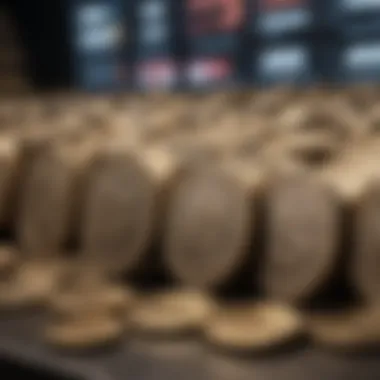Explore Your Options to Trade Coins for Cash Today


Intro
Discovering how to trade-in coins for cash is a relevant topic for many people who own a variety of coins. Whether the coins are frequent change from purchases, collectible pieces, or simply remnants of old collections, knowing how to convert them to cash can be beneficial. Understanding the different venues and methods opens the door to making this process efficient and profitable. Navigating through the options can empower individuals aligning their financial strategies with their unique circumstances.
Overview of the Topic
When someone talks about trading in coins for cash, it referes to the process of exchanging physical currency for monetary value. This act tends not just to provide immediate cash but can also aid in the realization of a financial goal or simply clear out clutter. The importance of understanding this topic extends beyond simply converting coins – it is connected to notions of financial management and investment strategies that individuals might consider as they manage their resources.
Key benefits of converting coins into cash include:
- Liquidity: Coins can be resources that gather dust if not turned to cash. They can make cash readily available for immediate needs.
- Space: A high volume of coins can create clutter. Converting them to cash clears up physical space in the home.
- Financial Strategy: People can reallocate to better investments or necessities after trading in their coins.
In summary, having knowledge on this topic can lead to informed decision-making and improved financial health for individuals.
Prelude to Coin Trading
Coin trading is a specialized facet of personal finance that captures the intersection between collecting, investment, and monetary exchange. For many, coins represent not just a hobby, but a potential source of cash that can aid in financial decision-making. Understanding the mechanisms behind where to trade these coins effectively can maximize returns and provide a deeper insight into the value each possesses.
Understanding Coin Value
The value of a coin is not merely a reflection of its face value; it encompasses historical significance, rarity, condition, and demand in the marketplace. Before trading, it is imperative for individuals to grasp what contributes to a coin's value. For example, collectible coins such as those minted commemoratively usually possess higher value due to their limited supply and specific appeal to collectors. On the other hand, currency coins, such as regular circulation money, hold value primarily based on the metal content and numismatic value, which can fluctuate depending on the market dynamics. Inherent factors, such as mint marks, the year of minting, and even the geographical context play substantial roles in deducing value. Furthermore, economic trends or collector interests can impact a coin's worth significantly.
Importance of Trading Coins for Cash
Trading coins for cash represents not only a practical financial maneuver but also offers the opportunity to convert asset value into liquid capital that can serve various financial needs. Since precious metals, antique coins, or even contemporary collectables can acknowledge considerable financial advantages, traders often capitalize on favorable market conditions. The decision to trade coins can stem from the desire to declutter personal spaces or to reinvest funds into more profitable avenues, such as stocks or bonds. Additionally, insights gained from these transactions can yield a better understanding of asset management as they pertain to individual financial strategies. The very act of engaging in coin trading reinforces timely awareness of the economic landscape, making individuals adaptable as market conditions change.
Types of Coins You Can Trade
Understanding the different categories of coins you can trade is crucial. Each type carries its own characteristics, market value, and collectible appeal. Traders usually choose according to profit goals and interests. Knowing these types helps to navigate options for cash returns efficiently.
Collectible Coins
Collectible coins, also named numismatic coins, vary widely in terms of historical significance, rarity, and demand. They often achieve high value not just based on their metal content, such as gold or silver, but their age or unique characteristics. Coins like the American Eagle or the 1909-S V.D.B. penny come to mind when thinking about coins collectors seek.
Factors including condition, provenance, and grading scale influence their worth. A specialized approach is necessary here, as market demand fluctuates based on trends in collecting. Engaging with respected dealers or platforms can provide insight to maximize one’s collection value. The emotional component also plays a role in this coin sector as enthusiasts might invest partially driven by passion.
Currency Coins
Currency coins represent legal tender traditionally issued by governments. Although these coins may hold face value, some, especially if they are older or rare, can possess added collectable value. The quarters, nickels, and other denominations from historic mints might captivate interest. Some collectors track down limited series monetary issues, which might not inherently carry high value but bring uniqueness. A common example can be seen in state quarters or the various design iterations of the Presidential dollar coins.
While ordinary currency coins can return cash quickly, specialized coins often draw in deeper interest than preliminary face value. Local collectors, coin shows, or even specific economic events can influence market conditions to help net larger profit than expected if you know what to look for.
Investment Coins
Investment coins are created specifically for the purpose of acquiring wealth. These coins can be consisting of pure metals, primarily gold or silver. The American Gold Eagle and Canadian Maple Leaf serve great examples, respected for their quality and tradability. The typical return potential depends significantly on commodity prices that shift over time.
Investors generally focus on the bullion aspect of these coins, with less emphasis on the artistic merits that define collectible coins. Investing in these coins often requires individuals to factor the economy and precious metal market into strategies effectively. As factors like inflation may sway asset demand, investment coins have gained substantial popularity among individuals seeking stability through solid, tangible assets in uncertain markets.
Investing in coins can not only add diversity to one’s financial portfolio but also provide a fascinating hobby.
By knowing and understanding these categories, individuals can better position themselves to explore the avenues available through trading and gain a foothold in the niche of numismatics. Each type offers distinct paths and benefits that can lead to profitable transactions and adept investment choices.
Where to Trade Coins
The actual trading of coins involves multiple avenues, each presenting unique benefits and considerations. Understanding these options can help individuals maximize the value they receive from their collections. The key to successful trading lies in knowing where to focus your efforts. Whether you are a seasoned collector or a novice looking to cash out, familiarity with different trading venues is imperative.
Local Coin Dealers
Local coin dealers are often the first point of contact for anyone wishing to trade coins for cash. These professionals have specialized knowledge and experience in the market. It is important to choose a dealer who is reputable. Local dealers can provide immediate cash payment depending on their assessment of the coin's value.
Advantages of Local Coin Dealers:


- Personal Interaction: Engaging directly allows for better communication and quicker transactions.
- Expert Valuation: Most dealers can appraise your coins on the spot.
- Accessibility: They are usually situated in accessible locations serving your local area.
Considerations:
- Some may offer lower prices than online options due to their overhead costs.
- Be mindful that not all dealers are equal. First observe their credentials and customer reviews prior to engagement.
Coin Shows and Expos
Another effective venue for trading coins is coin shows and expos. These events allow collectors and sellers to congregate under one roof, creating an atmosphere of competition and collaboration. At coin shows, you have the chance to meet numerous dealers and trade with other collectors.
Benefits of Coin Shows:
- Wide Selection: You can compare offers across multiple dealers in a single setting.
- Networking Opportunities: Such events allow the building of connections with fellow enthusiasts and experts.
- Market Trends: They give insights into current market trends, providing you information on recent valuations.
Considerations:
- Attending shows may involve travel expenses and an entry fee.
- Events have schedules, so planning your attendance is crucial.
Pawn Shops
Pawn shops represent another option, albeit with distinct characteristics. They accept coins and cash out based on immediate demand. Trading coins at a pawn shop might result in faster cash but at times less advantageous pricing.
Pros of Pawn Shops:
- Quick Cash: The transaction usually takes little time.
- Less Formal: Less pressure compared to dealing with specialized dealers.
Cons:
- Pricing can be lower since they operate based on market fluctuations.
- Pawn shop employees might not have extensive coin expertise.
Online Marketplaces
As technology evolves, online marketplaces have emerged as legitimate platforms to trade coins. Websites such as eBay or dedicated coin trading sites allow for ease of access. They can significantly reach a broader audience compared to local options.
Key Points About Online Marketplaces:
- Higher Sales Potential: You can potentially achieve a higher sale price since buyers come from a wider geographical location.
- Convenience: The ability to trade from home is appealing.
Consider Considerations:
- Safety and authenticity can be a concern. Research buyer and seller ratings thoroughly.
- Fees for listing and selling can reduce your profit margins.
Banks and Financial Institutions
Certain banks and financial institutions provide services for buying and selling coins. If you possess valuable coins, particularly classified currency, some institutions may hold auctions or trade facilities. Consulting with a bank representative familiar with their coin policy is essential.
Advantages of Using Banks:
- Trustworthiness: Banks have regulatory oversight lending credibility.
- Instant Transactions: Being a bank, transactions tend to be secure and often immediate.
Considerations:
- Their services might not be as comprehensive or informative compared to specialized dealers.
Following these routes enables effective access to providing exchanges for coin valuation. Recognition of the importance to explore various channels is required to trade your coins most successfully.
Valuing Your Coins
Understanding the value of your coins is crucial when considering converting them to cash. It directly affects the amount you can get during trading. Generating a precise estimate allows you to determine whether it is a advisable time to trade or hold onto your collection. Various factors contribute to a coin's value. Each elements has its weight. You should consider the overall condition, rarity, and the demand on the market.
Factors Affecting Coin Value
When assessing the value of a coin, several important factors come into play:


- Condition: The state of a coin is often classified as poor, fair, good, very good, or uncirculated. Higher rates are assigned to coins in better conditions.
- Rarity: Coins that were minted in lower quantities typically obtain a higher value due to their scarcity.
- Market Demand: What collectors or buyers are currently seeking impacts prices significantly.
Analyzing these complex layers can help ensure a more informed trading experience. It is necessary to no only rely on symbols but tangible framework while making honest assessment about items.
Using Price Guides
Price guides are significant resources. They offer an ongoing reflection of current market values based on real sales data.. The information presented in these guides can level up your understanding of coin value. Guides such as the Standard Catalog of World Coins and The Red Book, not only state prices for coins but provide background context around rarity and historical significance, further enhancing your appraisal of each piece. Make sure to choose updated editions to ensure reelevant information. Keeping on mind fluctuation can make even simple step much more difficult, but necessary.
Professional Appraisals
If you wish to trade several coins in large quantities, it might be beneficial to obtain a professional appraisal. A reputable coin appraiser can provide an unbiased analysis of the monetary value. Factors like grading and enhanced evaluating expertise support your individual understanding. While you might incur a nominal cost for this service, the worth of accurate valuation could justify the expense in the end. This approach helps you navigate various complexities positively.
Consider an appraisal a small investment. The returns might significantly exceed your initial expense.
This cohesive base you create regarding your coin values informs better choices during negotiations and facilitates smoother transitions in trading processes.
Process of Trading Coins for Cash
Trading coins for cash involves a systematic approach that requires a thorough understanding of the process and its pivotal elements. Engaging in this kind of transaction provides substantial possibilities for financial gain alongside the fulfillment of decluttering efforts that your coin collection may facilitate. Here, we will discuss preparation for trading and negotiation tips, both key aspects when one wishes to convert coins into cash efficiently.
Preparation for Trading
Getting ready to trade your coins is the first step toward a successful transaction. Proper preparation helps ensure you understand the coins' value and what to expect during the negotiation process.
- Research Your Coins: Start with gathering information about each coin in your collection. Use online resources like Wikipedia and Britannica to find details regarding the coins' ages, mint marks, and any historical significance.
- Sort Your Collection: Organize your coins into different categories — by type, year, or condition. This can facilitate a more straightforward discussion with potential buyers or dealers during trading.
- Assess Coin Conditions: It's crucial to evaluate each coin's physical condition as it affects its market value. Utilize grading guides to determine the state of your coins. Registration in relevant online forums, for example Reddit, might yield feedback on unique aspects of your coins.
- Documentation: If applicable, gather any relevant documentation that might aid your sale, such as previous appraisals, purchase receipts, or certificates of authenticity. Having this paperwork ready can increase buyer confidence in the sale.
- Identify Potential Buyers: Consider who your potential buyers might be. Are you looking at local business prospects, online marketplaces or even flea markets? Knowing your audience can focus your selling strategy appropriately.
By following these preparatory steps, you not only enhance the chances of going home with cash but also build confidence in your ability to engage in transactions in the coin market.
Negotiation Tips
Once you are prepared, the negotiation stage plays a significant role in the overall success of your trading experience. Understanding negotiation dynamics can help in achieving a favorable outcome.
- Set Your Expectations: Before negotiations, set a clear idea of what to you want from the trade. Know your minimum acceptable price so you can negotiate from a position of strength.
- Be Informed: Carry your research into the negotiations. If you are aware of your coin values based on market fluctuations and historical prices, you are less likely to be underwhelmed or pressured to settle for less.
- Stay Calm and Composed: Throughout the negotiation, maintaining composure is essential. The negotiation process can be stressful, yet it is important that you stay grounded. This can influence the buyer's perception of you as a genuine seller.
- Open Communication: Discuss openly about the coins' features and why they hold value. Educating the buyer may assist in justifying your price expectations.
- Consider Counteroffers: Be open to reasonable counteroffers. This can often lead to a satisfactory arrangement for both parties involved, rather than just declining and walking away.
Successful negotiation goes beyond monetary figures — it is about establishing trust and ensuring both parties feel they benefitted from the arrangement.
By utilizing these tips, you improve your chances of a successful trading experience while ensuring that you receive appropriate compensation for your collected coins.
Legal Considerations
Understanding legal aspects when trading coins for cash is crucial. Ignoring these can lead to unexpected consequences. Legal considerations impact how individuals manage taxes and comply with regulations set by governing bodies.
Tax Implications
When selling coins, it's essential to understand the tax implications involved. Revenue from cashing in coins can be considered taxable income. The Internal Revenue Service (IRS) views certain types of metal coins and collectibles as investments. Subsequently, capital gains tax may apply when selling coins for profit.
Key Points on Tax Implications:
- If the coins are sold for more than what you paid, the profit is subject to capital gains tax.
- Keep good records of each transaction, including purchase prices and sale prices.
- Reporting is usually done on Form 8949 and Schedule D for your tax return, which helps track your capital gains.
- In some states, additional sales tax may be collected, depending on local laws.
To avoid any legal penalties, it is advisable to consult a tax professional who can provide specific guidance tailored to your situation. This ensures compliance and reduces any risk of issues with the tax authorities.
Regulations Surrounding Coin Trading
Coin trading is subjected to various regulations, which can differ based on geographic location. Auction houses, dealers, and online marketplaces each have rules that govern trading practices. Awareness of these laws can protect buyers and sellers alike.
It’s recommended to familiarize with:
- Local Laws: States may have particular requirements for selling precious metals, including licensing.
- Marketplace Rules: Online platforms like eBay or Etsy have their own rules concerning transactions.
- Disclosure Requirements: Sellers must disclose the authenticity and condition of the coins being traded, reducing fraud risk.
Following regulations helps build trust, allowing smoother transactions in the marketplace. Ensure you stay updated on any regulatory changes that could impact your trading activities. Proper adherence lessens the chances of disputes or penalties and fosters sustainable trading practices.
It's vital to navigate the legal landscape correctly, as mishandling legal considerations can lead to hefty consequences.


Advantages of Trading Coins for Cash
Trading coins for cash offers multiple benefits that can be both financially advantageous and personally satisfying. This section examines these advantages in detail, providing insights into the significant elements of converting coins into cash.
Financial Gain
One of the principal advantages of trading coins for cash is the potential for significant financial gain. Coins, particularly collectible and rare types, may appreciate in value over time. By trading them, a collector can leverage this increased value, turning what was once a hobby into a profitable endeavor.
After valuing your coins by using trusted price guides or consulting professionals, you may find that coins are worth far more than their face value. For instance, some collectible coins can command prices that exceed their metallic content, appealing to specially interests ed audiences.
Factors influencing this gain include market demand, rarity, and the condition of the coins themselves. Individuals should carefully consider these factors when determining the timing and method of sale. Engaging locally or utilizing online platforms like eBay or specialist collectors' websites presents additional avenues for reaching buyers willing to pay a premium.
Decluttering Your Space
Another important advantage is the opportunity it provides to declutter personal spaces. Over time, a coin collection can grow considerably, taking up valuable space. By trading coins for cash, collectors not only receive monetary compensation, but they can also free their environments of items that might no longer hold significance.
This process fosters a sense of order and can lessen the emotional burden associated with excessive belongings. With more space available, individuals can focus on preserving quality items or cultivating new collections that better reflect their changing interests.
Ultimately, converting coins into cash serves as a dual-purpose operation: enhancing both one’s finances and one’s living space.
Trading coins for cash can transform a long-held collection into tangible financial resources and a more organized environment.
Challenges in Coin Trading
Challenges in coin trading present significant considerations for potential traders. While trading coins can offer avenues for financial gain, knowledge of the inherent challenges is vital. Understanding these viewpoints allows for informed decision-making, essential for favorable trade outcomes.
Market Volatility
Market volatility can be a major concern for those trading in coins. This fluctuation often stems from various factors, including economic conditions and demand within specific collecting communities. The prices of collectible coins, for instance, can dramatically shift based on economic reports or historical interest in different coins or series.
Keeping an eye on changing trends is important so traders can adjust their strategies. Here are aspects that can contribute to market volatility:
- Economic Indicators: Reports related to unemployment or inflation can lead traders to make quick investment decisions.
- Collector Trends: Interest in specific designs or minting year can spike unexpectedly, affecting values.
- Geopolitical Factors: Events like trade policies or international relations shifts can have unforeseen consequences on coin trading markets.
Understanding these factors is crucial in evaluating the timing of buying or selling coins.
Being aware of the unpredictable nature of the market allows collectors and investors to mitigate dangers. Set realistic expectations concerning value fluctuation to remain grounded.
Risk of Fraud
Fraud is another critical risk associated with coin trading. Many enthusiasts will encounter activities that seek to exploit novice traders during all aspects of trading—from purchasing to selling.
Here are potential risks to watch for:
- Counterfeit Coins: Identifying authentic currency can be complex, leading to costly mistakes. Make sure to use trusted sources and get opinions from experts.
- Misleading Sellers: Online platforms can sometimes harbor dishonest sellers who misrepresent their coins’ value or condition.
- Payment Frauds: Use varified payment methods to protect oneself when exchanging money, especially online.
Avoid practices like rushing purchases or skipping proper evaluations. Education helps unlikely traders unwillingly succumb to fraudulent schemes. Develop a detailed understanding of your coins and conquest that risk. Traders can conduct proper verifications to safeguard transactions.
Overall, acknowledging these challenges equips traders to assess decisions accurately within the coin trading context.
End
In the realm of coin trading, understanding how to efficiently convert your collection into cash is essential. This article has provided you with a thorough exploration of the various ways to trade coins, along with practical insights that enhance your readiness to engage in such transactions. The focus on specific methods serves to clarify the steps one can take and the considerations that must be made.
The recap of main points has highlighted crucial avenues for trading coins that include local dealers, online platforms, and specialized shows. Each method has its distinct advantages and challenges. Recognizing these can steer your decision-making towards the most suitable option based on your unique needs and expectations.
In addition, we assessed the financial implications associated with coin trading, emphasizing both potential gains and limitations. Factors such as market volatility and risks inherent in the trading process can significantly affect outcomes. Thus, being aware of these elements will allow for more informed choices when diving deeper into the coin market.
Recap of Main Points
- Ensure preparation for trading by valuing your coins accurately.
- Recognize the specific locations where you can trade coins, varying from local dealers to online marketplaces.
- Understand the legal aspects, such as tax responsibilities, to prevent issues during trades.
- Be aware of the market conditions driving demand and pricing of coins.
- Gathering necessary documentation such as appraisals boosts your credibility.
- Adopting negotiation strategies helps attain better cash offers.
Final Thoughts on Coin Trading
Engaging in coin trading requires careful consideration and strategic approaches. Whether you are looking to declutter or make a notable profit, enhancing your knowledge is key. As previously explored, trading coins is not merely about obtaining cash; it can represent a significant regard for collectability, history, and more. You should facilitate some kind of currency exchange sensibly—not just as an immediate impulse but as a step towards achieving your financial goals and wishes for your collection. A follow-up on market trends might guide future selling or holdings.
Coin trading can be a rewarding experience if approached with diligence. Therefore, continue exploring the various aspects mentioned as you need practical and informed steps to move forward in the world of coin commerce.



